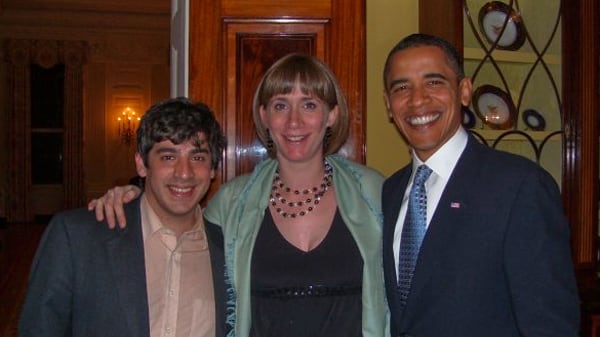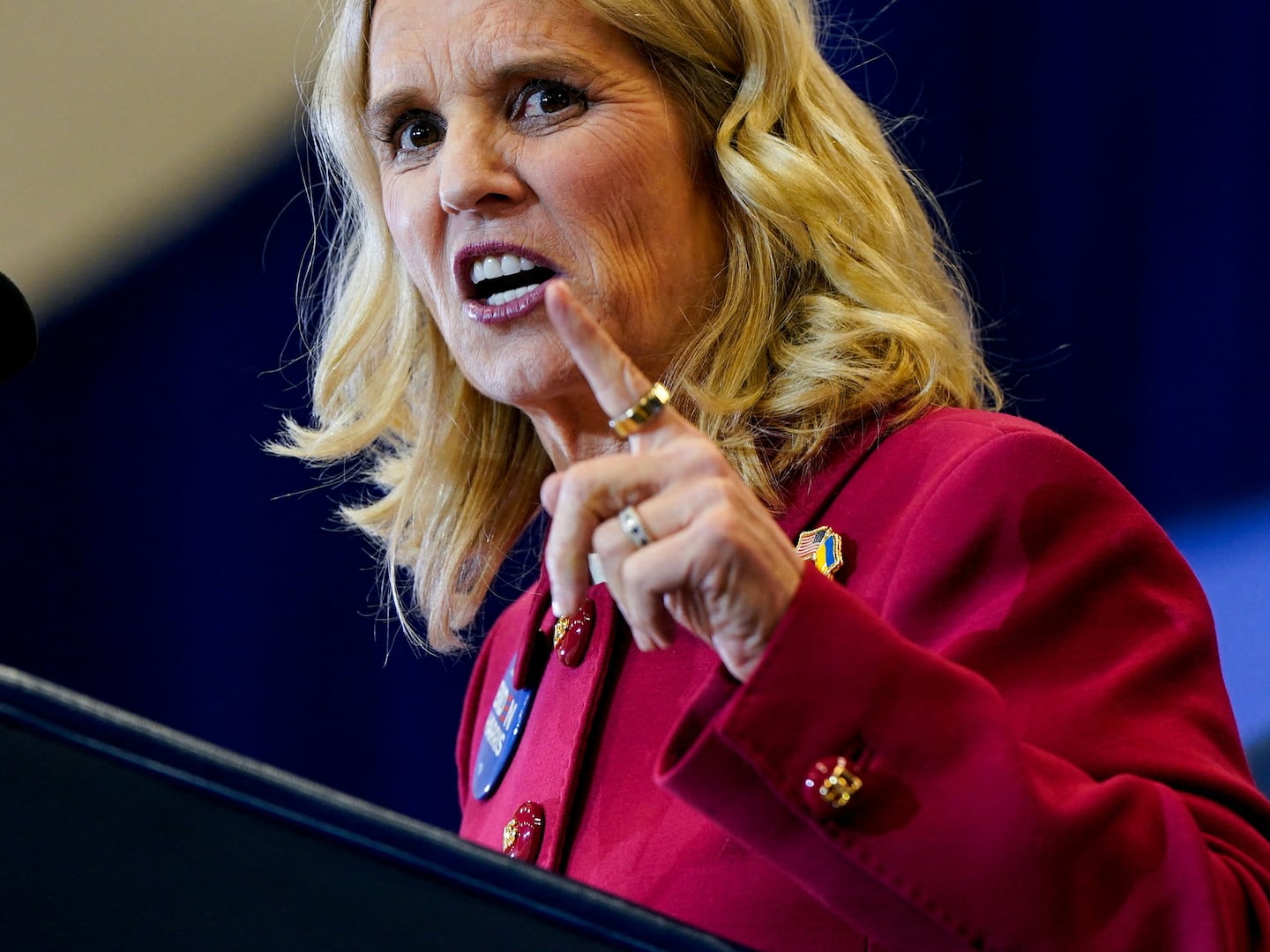I was a campaign widow.
My husband and I were married in May 2007 on a sprawling rent-a-ranch in the Texas Hill Country. On the drive from Houston, we’d stopped off for our marriage license in the former produce aisle of a Winn Dixie turned courthouse in San Marcos and from there drove off the grid.

Now, I’m no techno-ascetic, but for once I looked forward to a few days without cell-phone reception. My almost-husband felt otherwise. He was in the final stages of a job interview with the long-shot Obama campaign, and wedding day or no wedding day, he had to answer the phone when it rang. A funny role reversal, I observed, since I was the one who’d forced him to get the phone: “What if I get plowed down by a crosstown bus and they try to call you from the ambulance only they can’t because you’re the LAST PERSON IN NEW YORK CITY without a cell phone?”
My soon-to-be husband, Arun, finally found some bars amid the junipers and, an hour before our rehearsal dinner, he accepted a nebulously defined job in the new-media department of Obama for America. Horrifying salary notwithstanding, I was enthusiastic about the new venture, especially about the move from New York to Chicago. I was sick of our condemned railroad walkup and the backbreaking schlep to the Wash-N-Fold and the whole Brooklyn grind in general. Chicago would be luxurious and relaxing for the six-months-max we’d be there. We’d have a dishwasher! A washing machine! In our actual apartment.
So we headed west, and just like that, everything was different. Not vaguely “marriage is different from cohabitation” different, and not different like a landlocked Midwestern city with unfamiliar words like “Indiana” and “Wisconsin” on the funnily named highways was different from living three doors down from the Brooklyn-Queens Expressway. It was just a profoundly, unrecognizably all-new life.
In the frenzied preparations for our move, I’d never reckoned that the boyfriend in whose company I’d spent roughly 20 out of 24 hours for going on five years would overnight transform into one of those absent ’50s-sitcom husbands, home only long enough to change suits (or, in Arun’s case, Obama ’08 sweatshirts and Adidas shell-tops). My ever-present companion was suddenly just—gone.
Before Chicago, Arun and I had worked almost entirely out of our shared 700 square feet. “That counts triple,” a writer friend married to another writer had told me. “If you’re home during the day together, you’ve actually been together three times longer than couples who work outside the home.”
But once in flyover country, Arun wasn’t just not home during the day. He wasn’t home period. He was a filmmaker whose new job required him to follow the candidate at every stop on the campaign trail—and there turned out to be quite a few stops. While the cats and I marveled at our dryer’s air-fluff feature in a high-rise above Michigan Avenue, Arun was living in a succession of early-primary-state Days Inns.
The before and after contrast, while stark, was by no means unpleasant. “Now I understand how marriages last,” I told my wise writer friend, who after eight years of marriage (24, in self-employed time) was suddenly no longer married. “If you never see your husband, you never fight!” She sighed sadly in affirmation.
I made friends in my building and held debate-watching parties in our Burj Al Arab–opulent rooftop recreation room. I loved turning on the news and always knowing exactly where my husband was. I’d see his head bobbing in and out of the frame as he ducked behind the candidate on a dais or rushed after him up the steps of the plane. It was almost like having him in the room with me, only with no dirty plates or socks. Campaign widowhood totally suited me, and I soon began to suspect that our setup beat the bill paying and bickering of an actual marriage.
Whenever the junior senator from Illinois returned home for his daughters’ parent-teacher conferences or North Shore fundraisers or whatever, I’d take Arun around the city I was getting to know, but mostly we just texted and emailed and interacted from afar like any other 21st-century couple. I spent the week of the Iowa caucus in a BO-scented (that’s for body odor, btw, not Barack Obama) motel in outer Des Moines. That first week of January 2008, Iowa was the center of the universe, and thanks to my husband I had a front-row seat.
Pretty soon we’d been married a whole year, though of course Arun wasn’t around to celebrate, not with the Oregon primary just around the corner. That summer I went on vacation by myself, visited my parents by myself, attended weddings by myself. It was like a reprise of the single life without any of that clichéd bouquet-toss anxiety.
That August, Arun spent an unprecedented 72 consecutive hours in Chicago while the Obamas went on their elitist Hawaii vacation. A few weeks later, in Denver for the Democratic National Convention, I felt suddenly woozy at a Texans in the Rockies champagne brunch. “You must have altitude sickness,” the bundler I’d met on the flight from Chicago told me. “Yeah, that must be it,” I said, pushing away the champagne flute. “I’ve never been much of a day drinker anyway.”
But when the queasiness hadn’t subsided by late afternoon, I stopped off at a CVS, and I peed on not one but three sticks until I could no longer deny the incontrovertible fact of my pregnancy. Right. I called Arun, who was in Montana for one last rally before the candidate’s big speech at Invesco Field. He told Reggie Love, who told the entire campaign press corps, and just like that there was no looking back.
I returned to Chicago shocked and thrilled and more than ever personally invested in an Obama victory. I was having a Hope Baby! An Obambino! But only, of course, if our guy won. A McCain baby—a McCaby?—just didn’t have the same ring.
The next week, during that best-forgotten flare-up of Sarah Palin mania that followed the RNC convention, I panicked. Sickened either by hormones or the prospect of a genuinely crazy person getting her hands on the nuclear football (again), I’d crawl to my laptop in the middle of the night and shovel what little money we had back into the Obama campaign coffers. Evenings I’d head to the downtown phone bank, and weekends I’d spend canvassing depressed regions of Indiana and Michigan. This baby deserved only the best in its first commander in chief.
When the election produced better-than-hoped-for results, I could relax in the knowledge that my little family’s future was assured. But then, a few weeks into the post-election flush, I noticed something funny. The campaign had ended, but I was still a campaign widow. Which made no sense, because the thing about campaigns is that they’re expensive and exhausting, but—unless you’re lucky enough to serve in the House of Representatives—they are also finite. Someone wins, someone loses, and eventually everyone goes home. Because otherwise how could real life possibly continue?
But Arun’s schedule never slackened much at all. During the transition, he worked as both still photographer and videographer, and post-inauguration he took on a similar role as during the campaign, following the now-president around and recording his every move.
As I packed for the move to D.C., I resolutely didn’t complain about my completely absent husband—not even when he went to work the morning after my C-section. But as the months of new parenthood wore on, my patience began to wear thin. I started to miss my husband, and to resent everything he was missing. Arun watched our baby crawl for the first time on an iPhone video, and walk for the first time on Skype.
My first Mother’s Day, he swooped in from a trip to the Deepwater Horizon oil spill bearing a bouquet of red roses. “What’s that?” I asked suspiciously. Did this completely uncharacteristic gesture mean he was having an affair? With something other than his job, that is. Arun blushed and looked down at his feet. “Um, well, the president was buying some for FLOTUS, and he said I’d be in trouble if I didn’t…”
Of course. Surprised I hadn’t seen the romantic transaction on MSNBC.
By that point, I couldn’t be appeased with some stupid secondhand FTD gesture. While I fully understood how amazing Arun’s job was, I was sick of raising our child on my own—especially since he’d stopped sleeping. Bed times had become protracted battles, and every day I woke with 10 more gray hairs. “Don’t you see?” I’d cry. “I’m going gray faster than your boss!”
“They make you look distinguished,” Arun would reply, then jet off to the G-8 or Ghana.
And then, one impossibly hot D.C. night—90 degrees at 9 p.m.—I just couldn’t do it anymore. With our son screaming upstairs, I called Arun, who was, remarkably enough, still at work, and I offered an ultimatum. “If you don’t show up around here more often, I’ll… I’ll…” What? Change the locks? Move in with my parents?
But no, I didn’t want to get rid of Arun. What I wanted was Arun back.
“You’ve been with Obama for four years!” I yelled. “That’s almost half as long as you’ve been with me!”
“Wow, really?” Arun whistled. “God, it seems like you and I have been together way longer.”
And though, if our lives were a Lifetime movie, Arun could have not one but TWO secret wives stashed in different corners of the country, he really did try to make more regular appearances at home. Was it a coincidence that our son soon started sleeping again? The premature grays I’d begun yanking out at stoplights slowed their takeover of my scalp.
When Arun finally left the White House, it wasn’t because he mourned all the gloriously subtle gradations of his child’s development that he’d missed, and it wasn’t because I’d pressured him to choose between the president and his family, or not explicitly. It was because he was worn down, and his health was deteriorating, and it was time.
I wish I could say that all’s well that ends well—that Arun has never once regretted trading Air Force One poker games for potty training, or insider Kremlin tours for day-care dropoffs. And while we’ll likely never again spend hours upon hours sitting silently at adjacent computers, or at least not until retirement looms, at least we see each other most days of the week. And I no longer have trouble remembering what brought us to that Hill Country ranch what feels like so many election cycles ago.






